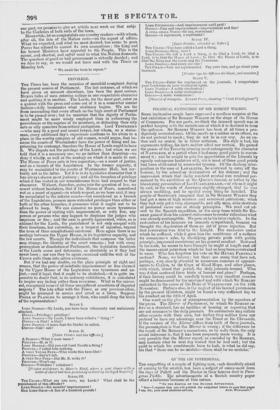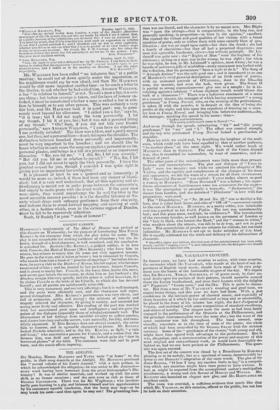OF THE LIE IMPERSONAL.
THE coquetting of a couple of fighting men, each dreadfully afraid of coming to the scratch, has been a subject of amusement from the days of Pallett and the Doctor in their famous duel in Pere- grine Pickle. Tlie advertisements of a Scotch country paper afford a ludicrous instance of this nature.
"To THE EDITOR OF THE DUNDEE ADVERTISER.
" SIR-I request that you will publish the subjoined letters in your first paper I am, Sir, your most obedient servant, AND. WILLISON."
"\Y ILLIA U 11.scirvEV, Esq. Dundee, April 11, 1831.
"Slit—On my arrival to-day from London, a copy of the Dundee Advertiser newspaper of the 7th instant was put into my hands, by which I see it stated, that, at a public meeting of the inhabitants, you declared that I was an infamous liar. You must be aware, that if it be true that you used such an expression in relation to me, that I cannot overlook it and I therefore call on you to state explicitly, whether you did so or not—in order that I may be guided as to what farther steps it may be necessary to adopt. My friend, Mr. F. M. Carnegy, who has taken the trouble to deliver this letter, has full authority to act for me in the matter. I am, Sir, your most obedient servant, AND. WILLISON." "AND. WI LLtsoN, Esq. Dundee, April 11, 1S31.. " a—In reply to your letter delivered me by Mr. Carnegy, Iran have no hesi- tation in stating that the expression ' intiuncus liar' was nut meant to apply to you PERSONALLY, and I stated so at the meeting on Monday. I am, Sir, yours respectfully, WM. HACKNEY." Mr. WILLISON has been called " an infamous liar," at a public meeting : he could not sit down quietly under the imputation, or his neighbours would say he was afraid, and then Mr. HACKNEY would be still more impudent another time : so he sends a letter to the libeller, to ask whether he had called him, ANDREW WILLISON, a liar " in relation to himself," or not. To call a man a liar, is a seri- ous thing ; but before revenge is taken, and the laws of honour sa- tisfied, it must be ascertained whether a man is called a liar in rela- tion to himself, or to any other person. This was certainly a very fair hint, and Mr. HACKNEY took it in good part : nay, he gene- rously went beyond his allowance. " I called you a liar," says he, "it is true ; but I did not apply the term personally. I bit my thumb, I bit it at you, too ; but it was not a personal biting of my thumb." " Oh! then, if you did not bite your thumb personally," says ANDREW WILLISON, " I can have no objection ; I am perfectly satisfied." The blow was a blow, and a pretty severe one, but then, not a personal blow—it only fell upon the shoulder. The distinction between knocked down personally and impersonally, must be very important to the knockee ; and we should like to know whether in such eases the surgeon applies a personal or an im- personal plaster, and brings in a bill of a personal or an impersonal character. " Sir, you hit me." " I did, Sir, I hit you severely." "But did you hit me in relation to myself ?" " No, Sir, I hit you, but I did not mean to apply the blow personally. I have the greatest respect for you, though I consider I was quite right in giving you an impersonal horsewhipping."
It is pleasant at least to see a quarrel end so innocently : it would be more so, indeed, if there had been any danger of blood- shed : but it is very well understood, that all this squaring and at- titudinizing is meant not to make peace between the antagonists, but simply to make peace with the cruel world. If the poor men were alone, they would interchange the lie and the blow in the most amicable manner possible : it is the dreadful tribunal of So- ciety which drags such unhappy gentlemen from their obscurity, and induces them to stand forward mopping and mowing at each other, in a fashion which, even in the extreme region of Dundee, must be felt to be excessively ridiculous. Such, 0 Society ! is your "code of honour !"



























 Previous page
Previous page